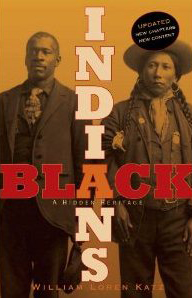Black Indians: A Hidden Heritage

The compelling account of how two heritages united in their struggle to gain freedom and equality in America is now available with updated, revised and expanded content.
The expanded and updated edition of Black Indians: A Hidden Heritage (click to order from Amazon Books) brings the Native American and African American alliance that for four centuries challenged the European conquest and slavery into the 21st century with additional research and documentary and photographic evidence.
The new edition reveals the story of the African guides and translators of the colonial era who became valued contacts with Indigenous peoples, examines the African and Indian alliance known as the Pueblo revolt of 1680 that ended Spain’s rule of the southwest for a dozen years, introduduces Francisco Menendez and the 1738 Black Indian community that defended its liberty in Florida against British incursions, and describes the Lowry Gang in North Carolina that fought the Civil War Confederacy and then battled the KKK.
This edition also provides new information on how western African American pioneer women often took the lead in aiding Native Americans; the ironic role of the Black “Buffalo Soldiers” sent to fight the great Native American nations in the West, and those who refused.
Katz introduces readers to Lucy Parsons, a former enslaved Black Indian, and a brilliant, and fiery orator and writer who became a socialist revolutionary; and to militant Black Indian Congressman George Henry White who introduced the first anti-lynching bill in 1900. Readers will hear of both the debates and efforts toward unity started in the 1960s between Dr. Martin Luther King, Dick Gregory, Stokely Carmichael [Kwame Ture], the American Indian Movement, and Black Power Movement, and between political prisoners Leonard Peltier and Mumia Abu Jamal.
Reviews of the original Black Indians
“A major contribution, particularly valuable because the subject has been overlooked.” — John Hope Franklin
Black Indians “digs up stories that have not been told, introduces us to people and events that have been shamefully ignored and does it all in clear, clean prose.” — Howard Zinn
“A remarkable book… Perhaps if kids were taught this version of history, the mad dash of imperialism that marked much of the 20th century would not have occurred” and Black Child Magazine said it was “a classic” whose “many rare, antique engravings and photographs help prove the author’s leading points.” — Mumia Abu Jamal